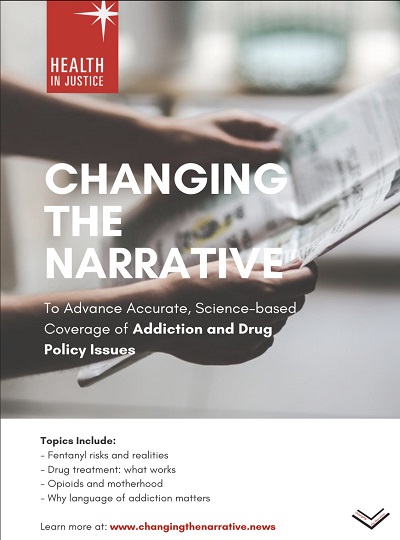I’ll be talking about the myths and realities of drug courts with Changing the Narrative Webcast host and journalist Zachary Siegel (@ZachWritesStuff ) on Thursday, July 11, 2019 at 3:00 PM EDT. Click here to listen live.
Listeners are invited to type and submit questions through chat. I would welcome hearing from you. For those who can’t listen in real time, the interview will be posted afterwards on Changing the Narrative Events.
I am honored to be interviewed by journalist Zachary Siegel. When I walked into the hotel lobby in Boston on the September, 2018 morning of what became the founding day of Changing the Narrative, I exchanged a friendly smile with a man with a suitcase. I didn’t know him, but just had a feeling. I asked for a ride. Keith Brown said, “We need to wait for Zach.” I asked, “‘Zach’ as in @ZachWritesStuff?!”
Keith drove, Zach sat shotgun, and I leaned forward from the back seat as we headed towards Northeastern University. My jaw dropped as I began listening to the boldest talk about addiction and recovery I’d ever heard. The clandestine knowledge I had in my own head after reading Maia Szalavitz’s book, the Surgeon General’s report, Facing Addiction in America, and conducting exhaustive literature reviews on the research on addiction was spoken of matter-of-factly in the front seat. I offered a few bits about evidence-based counseling for substance use disorders. Nods, not reprimands! Emboldened, I described constitutional, legal, and humanitarian grounds for opposing drug courts. I was astonished to see the “of course” nods in the front seats.
I got tears in my eyes when I saw this photo of Zach, my CTN co-founder and former co-traveler, who was arrested for recording testimony while doing his work as a reporter. Force can be used, both overtly and covertly, to attempt to silence people who seek facts.
“If you see something, say something.” Thanks to the invitation from Zachary Siegel to speak out, I will say many things – and cite sources – about drug courts.
Here is a summary of my findings.
And here is my full report on drug courts, approximately 4,500 words.
If you find facts altering your beliefs about drug courts, here are some actions you might take:
- Attend a drug court hearing. Watch for drug court judges giving medical advice without a medical license – including denial of life-saving addiction and mental health medications – giving mental health advice without a counselor’s license, financial advice without financial adviser credentials, and legal sanctions, including jail time, without an attorney present.
- Go to your state attorney’s office and ask for a copy of the drug court handbook. (In some locales, individuals who have requested copies have been denied them.)
- Take a copy of the drug court handbook to a medical professional not affiliated with drug court or the administrative/treatment provider and ask if the medical components of the handbook meet medical standards of care for people with substance use disorders and co-occurring mental illnesses.
- Take a copy of the drug court handbook to an attorney not affiliated with drug court or the administrative/treatment provider and ask which of the policies, if any, violate constitutional, legal, and/or human rights.
- Take your findings from independent sources to your local government bodies that fund drug courts and ask why this government body is funding a program that violates medical standards of care and/or constitutional, legal, and/or human rights. (Here is the Commonwealth of Virginia’s explanation of the existence and operation of drug courts.)
- Prepare to hear 1) this rebuttal: “I know it works because I’ve seen it work!” and 2) this threat: “Do you want us to throw the baby out with the bath water? Fine, let’s just dismantle drug court and every criminal addict can go directly to jail. They deserve it anyway.”
That’s as far as I have gotten locally. I cannot get stigmatizing language replaced with factual language (the local use of “addicted babies” is systemic). I cannot get heard the facts about effective addiction treatment or rights violations. I am advised to “go slowly” and “build consensus.” Coercive probation and parole, drug courts, jails and prisons are designed to traumatize. With two-thirds of people with substance use disorder already plagued with trauma symptoms, it’s simply inhumane to exacerbate this condition. One more moment of waiting creates manifold suffering now and into the future.
- If your local addiction policy and treatment culture resists reform from within, contact your local public officials, show them the national data, and your local findings. Ask for them to justify the existence of drug courts.
- Consider initiating lawsuits in your state against drug courts similar to these:
– Setting Precedent, A Federal Court Rules Jail Must Give Inmate Addiction Treatment, NPR, 5/4/19
– New bill could prevent jail time for relapse in Massachusetts, The Daily Free Press, 2/7/19
– Jail Ordered to Give Inmate Methadone for Opioid Addiction in Far-Reaching Ruling, The New York Times, 11/28/18
If you do nothing else, ask your primary care physician to give you an observed urine drug screen. Remember that substance use disorder is a health condition. Use of substances is a symptom of that condition. The presence of substances in your urine would simply be indicative of you continuing to have this health condition.
Become aware of what you feel and think while your genitals are watched during an act of biology – a procedure which can be mandated daily, weekly, and monthly for people with substance use disorder. Don’t ask how much the drug screen costs. You’re responsible for the bill, regardless. Become aware of fighting paruresis – difficulty urinating near others – when you realize that the results of this natural act could cause you to get sent to treatment, fired from your job, lose custody of your children, have you arrested, and, possibly, end up in drug court.
#RecoveryMovement #ChangingTheNarrative
The views expressed are mine alone and do not necessarily reflect the positions of my colleagues, clients, family members, or friends. This content is for informational purposes only and is not a substitute for medical or professional advice. Consult a qualified health care professional for personalized medical and professional advice.
Anne Giles, M.A., M.S., L.P.C., is a counselor in private practice in Blacksburg, Virginia.
Last updated 7/10/19

